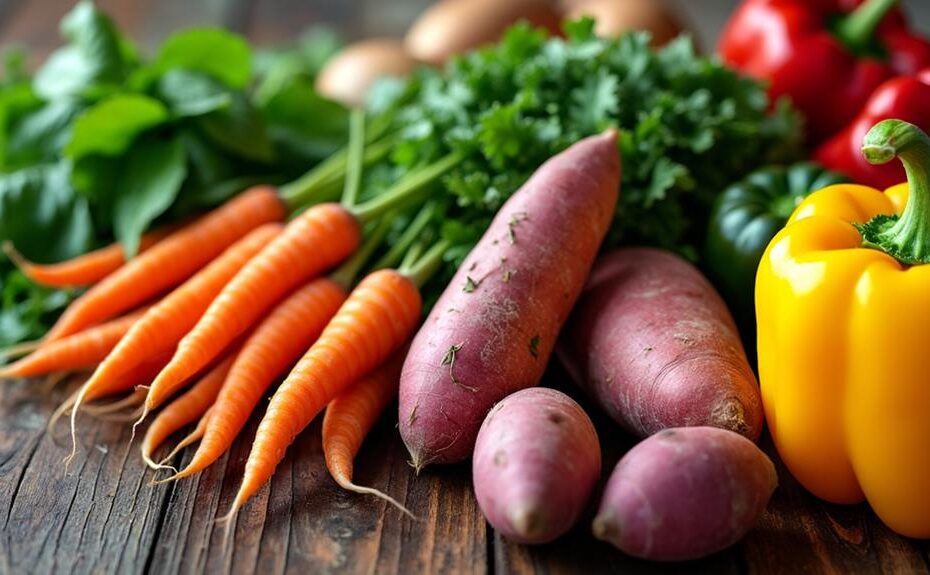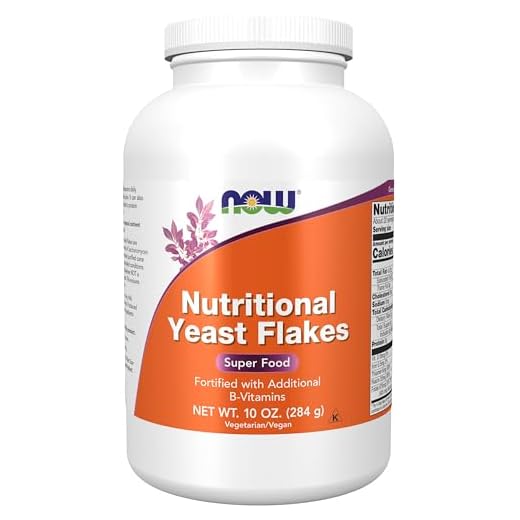







As a vegetarian, sweet potatoes, carrots, and spinach are your top sources of vitamin A, each providing significant amounts. Sweet potatoes boast about 1,920 mcg per cup, while carrots offer 1,280 mcg, and cooked spinach contributes around 943 mcg. These vegetables contain carotenoids, which your body converts into vitamin A, essential for vision, immune function, and skin health. To enhance absorption, consider combining these foods with healthy fats, like olive oil or avocado. However, individual conversion efficiency can vary, so explore more options to meet your needs effectively.
Key Takeaways
- Sweet potatoes are one of the highest sources of Vitamin A, providing 1,920 mcg RAE per cup.
- Carrots are also excellent, offering 1,280 mcg RAE per cup and easily integrated into meals.
- Cooked spinach contains 943 mcg RAE per cup, making it a great addition to a vegetarian diet.
- Incorporating healthy fats, like avocado or olive oil, enhances the absorption of carotenoids from plant sources.
- A diverse diet with various colorful fruits and vegetables improves Vitamin A intake and conversion efficiency.
Daily Vitamin A Requirements
Daily Vitamin A requirements vary based on age, gender, and life stage, so it's important to understand your specific needs. Adult men typically need around 0.7 mg (700 mcg) of vitamin A daily, while adult women require about 0.6 mg (600 mcg). If you're pregnant, your daily vitamin intake should increase to 0.8 mg (800 mcg), and if you're breastfeeding, it rises to 1.3 mg (1,300 mcg).
Children also have varying needs; those aged 1-3 years require approximately 0.4 mg (400 mcg) per day, while kids aged 4-10 need around 0.5 mg (500 mcg). Importantly, the UK guidelines recommend that your combined intake from food and supplements doesn't exceed 1.5 mg (1,500 mcg) daily to prevent toxicity.
For vegetarians, it's important to incorporate a variety of carotenoid-rich plant foods into your diet. Your body can convert these carotenoids into vitamin A, helping you meet your daily vitamin A intake effectively. By understanding these requirements, you can make informed dietary choices that suit your lifestyle and nutritional needs.
Importance of Vitamin A
Vitamin A plays a significant role in maintaining your overall health and wellbeing. It's essential for healthy vision, immune function, skin health, and reproductive health. Without sufficient vitamin A, you risk serious health issues, including vitamin A deficiency, which can lead to blindness and other complications. Additionally, Nutricost Vitamin A Softgel Capsules are a convenient supplement option for those who may struggle to get enough vitamin A from their diet alone. Your body relies on carotenoids found in plant sources to convert them into retinol, the active form of vitamin A. This conversion is critical for various bodily functions and reinforces the importance of vitamin A in your diet. To meet your needs, aim for a balanced intake, with the recommended daily allowance being approximately 900 mcg for men and 700 mcg for women, adjusting for pregnancy and lactation as necessary.
Incorporating a variety of colorful fruits and vegetables, such as sweet potatoes, carrots, spinach, and kale, into your meals can help you access these essential sources of vitamin A. Regular consumption of these carotenoid-rich foods guarantees you meet your vitamin A requirements while supporting your overall health and wellbeing. Prioritizing vitamin A in your diet can lead to a healthier, more vibrant life.
Plant-Based Sources
When it comes to boosting your vitamin A intake as a vegetarian, incorporating a variety of plant-based sources can make a significant difference. Excellent plant sources include orange-fleshed vegetables like sweet potatoes, which provide about 1,920 mcg RAE per cup, offering 213% of the Daily Value (DV). Carrots are another great option, delivering approximately 1,280 mcg RAE, or 142% of the DV per cup. Ensuring adequate intake is essential for vision and immune health, highlighting the importance of vitamin A in your diet.
Don't overlook dark leafy greens, either; cooked spinach contains around 943 mcg RAE (105% DV) per cup, while kale provides 172 mcg RAE (19% DV). Butternut squash is also a stellar choice, packed with carotenoids.
To further enhance your vitamin A intake, consider adding colorful fruits and vegetables like mangoes and red peppers to your meals. These foods high in vitamin A not only contribute to your daily requirements but also offer a range of other nutrients that support overall health. By diversifying your diet with these rich sources of provitamin A carotenoids, you can effectively meet your vitamin A needs while enjoying delicious vegetarian options.
Carotenoid Absorption Factors
To effectively absorb carotenoids and maximize their health benefits, it's essential to evaluate various factors that influence their bioavailability. One key aspect is the presence of dietary fats; to enhance carotenoid absorption, aim for at least 2.4 grams of fat per meal. The food matrix also plays a significant role—steaming vegetables is preferable to boiling, as cooking methods affect nutrient release.
Genetic variability affects how well individuals convert beta-carotene to retinol, with about 50% of people showing low conversion rates. Additionally, your vitamin A status can be impacted by body mass index (BMI); higher BMI may impair carotenoid conversion efficiency, suggesting that weight management could improve your vitamin A utilization.
To guarantee you're getting enough carotenoids, include a diverse array of colorful fruits and vegetables in your diet. These not only provide a rich source of carotenoids but also enhance overall absorption. By understanding these factors, you can take proactive steps to improve your carotenoid absorption and, ultimately, your vitamin A status as a vegetarian.
Vitamin A Deficiency Symptoms
A lack of adequate vitamin A can manifest in several noticeable symptoms that may affect your daily life. One of the earliest signs you might experience is night blindness, which makes it difficult to see in low-light conditions. As the deficiency progresses, you could notice other symptoms like dry eyes and dry skin, both of which can be uncomfortable and distracting.
Moreover, vitamin A plays a significant role in maintaining a healthy immune system. With a deficiency, you may find yourself more susceptible to infections, as your body struggles to fight off pathogens. In severe cases, vitamin A deficiency can lead to corneal ulcers and scarring, potentially resulting in complete vision loss.
For children, this deficiency can be particularly alarming, as it may impede growth and development, leading to serious health complications. Regular monitoring and making sure you get enough vitamin A-rich foods are essential, especially if you're at risk of deficiency. By staying aware of these symptoms and understanding their implications, you can take proactive steps to maintain your health and well-being.
Recommended Food Combinations
Incorporating nutrient-dense food combinations into your diet can greatly enhance your vitamin A intake, especially for vegetarians. By pairing dark leafy greens like spinach or kale with healthy fats such as avocado or olive oil, you markedly improve the absorption of carotenoids, which your body converts into vitamin A. Regular intake of these essential nutrients supports long-term ocular health and reduces the risk of vision loss. Sweet potatoes, rich in beta-carotene, are another excellent option. When you enjoy them with a small amount of fat, like coconut oil, the bioavailability of vitamin A increases dramatically. For a tasty snack, try consuming carrots with hummus or a yogurt dip—this combination not only satisfies your palate but also helps in absorbing carotenoids due to added dietary fats.
Adding red bell peppers to a salad dressed with olive oil boosts your vitamin A intake while delivering a variety of other nutrients. Additionally, including butternut squash in a dish topped with nuts or seeds can enhance the conversion of carotenoids to vitamin A. These food sources work together to guarantee you're getting the essential nutrients your body needs, making it easier to maintain peak health.
Genetic Factors in Conversion
How effectively can your body convert carotenoids from plant sources into vitamin A? This process isn't the same for everyone due to genetic variability. Certain genes, particularly the BCMO1 gene, greatly influence your conversion efficiency of carotenoids like beta-carotene into retinol. Research indicates that up to 50% of individuals may experience reduced conversion efficiency, which can lead to vitamin A deficiencies if dietary intake isn't carefully managed.
If you have a lower conversion rate, relying solely on plant sources for vitamin A may not meet your nutritional needs. Additionally, factors such as body fat percentage can further impair carotenoid conversion, complicating your dietary requirements. Understanding your genetic predisposition can be instrumental in guiding your food choices.
For instance, if you find that your body struggles to convert carotenoids effectively, you might need to take into account incorporating more fortified foods or alternative sources of vitamin A into your diet. By being aware of these genetic factors, you can take proactive steps to guarantee you maintain adequate vitamin A levels, which is essential for overall health.
Supplementation Considerations
What are your options if dietary sources of vitamin A aren't enough to meet your needs? For vegetarians, beta-carotene supplements can be a viable source of vitamin A. This option is generally safer than taking preformed vitamin A found in animal products. The recommended dietary allowance (RDA) for vitamin A is 900 mcg for men and 700 mcg for women, so supplementation can help meet these needs if your diet falls short.
However, it's essential to limit your combined intake from food and supplements to 1.5 mg/day to avoid potential toxicity. Prioritize consuming carotenoid-rich foods like carrots and sweet potatoes, which can greatly contribute to your vitamin A levels. But if you face absorption issues or have specific dietary restrictions, consider supplementation.
Before starting any supplementation, it's wise to consult a healthcare professional. They can help guarantee that your choice aligns with your unique dietary needs and health conditions. In conclusion, while food sources should remain your priority, supplementation can be a helpful adjunct for vegetarians struggling to meet their vitamin A requirements.
Conclusion
Incorporating a variety of plant-based sources of vitamin A, like carrots, sweet potatoes, and spinach, is key for vegetarians. Just as a painter uses a palette of colors to create a masterpiece, you can balance your diet to guarantee adequate vitamin A intake. Remember to pair carotenoid-rich foods with healthy fats for better absorption, and consider genetic factors that may affect conversion rates. If needed, consult a healthcare professional about supplementation to meet your nutritional needs effectively.





